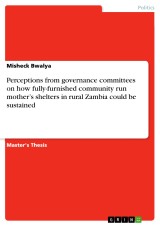Details

Perceptions from governance committees on how fully-furnished community run mother's shelters in rural Zambia could be sustained
1. Auflage
|
CHF 32.00 |
|
| Verlag: | Grin Verlag |
| Format: | |
| Veröffentl.: | 17.02.2020 |
| ISBN/EAN: | 9783346114228 |
| Sprache: | englisch |
| Anzahl Seiten: | 68 |
Dieses eBook erhalten Sie ohne Kopierschutz.
Beschreibungen
Master's Thesis from the year 2018 in the subject Politics - International Politics - Region: Africa, , language: English, abstract: Recently, world leaders adopted the 2030 Agenda for Sustainable Development to guide member countries and development agencies in tackling poverty, inequality and injustice making the sustainability of Projects and Programs a critical point of discussion within the development community. With declining levels of global aid, donors of programs in public health and community development are increasingly concerned about the sustainability of changes they initiate. Zambia like many other African countries has received a substantial amount of aid. However, one of the most critical obstacles is the extent to which aid-supported projects continue after donor exit.This was an explorative research study into sustainability determinants of fully furnished community run Mothers’ Shelters in Siachitema, Kanchele, Simakutu and Masuku rural health facilities in Choma and Kalomo Districts of Zambia. It sought to establish the role of governance committees in the sustainability of the Mothers’ shelters and their perception of sustainability compared to project plans. Secondary data collected through In-depth Interviews (IDI) using a semi structured interview guide was analysed using NVIVO 12 to cluster emerging themes and sub-themes from the data. A total of 14 in-depth interviews (IDI) were analysed. The study adopted a subjectivist ontological viewpoint and an interpretivist epistemological outlook. It was predicated on the theories of participation and empowerment. The research established five (5) major sustainability determinants of fully-furnished community run Mothers’ shelters as: financial resources, community support and participation, community empowerment, leadership and good governance and mainstreaming of Mothers’ shelter activities into Ministry of Health strategy, policy and systems. The study also established that sustainability of Mothers’ shelters was at three levels namely financial sustainability; institutional/organizational sustainability; and programmatic sustainability.The study concluded that appropriate policy or legislation, sufficient institutional support, sustainable financing mechanisms, effective management systems and technical backstopping will led to sustainability of fully furnished Mother’s Shelters.
Diese Produkte könnten Sie auch interessieren:

Inclusión educativa de niños, niñas y adolescentes migrantes venezolanos, en Colombia

von: Douglas Jiménez

CHF 16.00
















